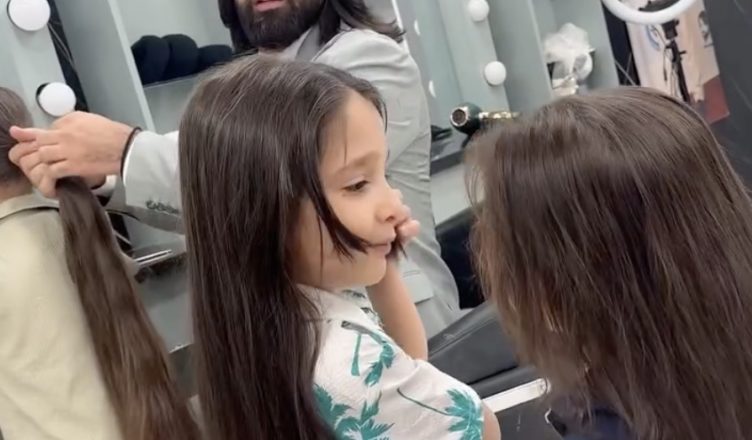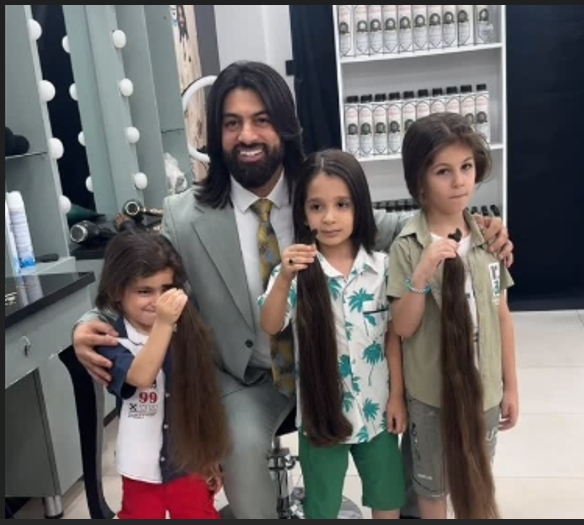The three of them were inseparable.
Eli, Noah, and Sam — born only months apart, raised on the same quiet street in the small town of Brookvale. They were known, even from a distance, for one thing: their hair.
It wasn’t just long. It was legendary.
Golden-brown strands that fell to their shoulders and shimmered in the sun when they played soccer in the park. They looked like the kind of kids you saw in fairy tales — half wild, half magic.
People always talked about it.
“They look like girls,” some said.
“Those boys need a barber,” others muttered.
But the boys didn’t care. Their mothers loved it, their teachers teased them kindly, and for years, the long hair was part of who they were — a symbol of their closeness, their difference.
Until the summer they turned thirteen.
It started with Sam.
He’d been quieter than usual that week. Restless. He’d stop in front of mirrors, touching his hair as if he didn’t recognize himself anymore.
“I’m cutting it,” he said one afternoon, his voice flat. “All of it.”
Eli blinked. “Why?”
Sam shrugged. “Just tired of it, I guess. Time for something new.”
Noah grinned, trying to lighten the mood. “What, like a midlife crisis at thirteen?”
But Sam didn’t laugh.
He looked up, eyes darker than usual. “It’s not just that. It’s… I had a dream.”
“A dream?”
“Yeah,” Sam said. “About someone — a man — cutting my hair. He said it was the only way to be free.”
The others stared at him, unsure if he was joking. But Sam wasn’t the type to joke about something like that.
Two days later, he convinced them to go with him. “It’ll be fun,” he said. “A fresh start. All three of us.”
So they did.
The barber shop sat at the edge of town — Harlan’s, a place most people forgot even existed. The sign was faded, the windows clouded with dust.
Inside, it smelled of cedar and aftershave. The old barber, Mr. Harlan, stood behind the chair, polishing a pair of silver scissors that gleamed like mirrors.
“Afternoon, boys,” he said, his voice low and calm. “Looking for a change?”
“Yes, sir,” Sam answered before the others could speak. “We all are.”
Harlan’s eyes drifted over them, resting on their long hair. Something in his expression changed — not quite a smile, not quite a frown.
“Well,” he said finally, “change always comes at a price.”
Noah rolled his eyes. “Yeah, yeah, how much?”
Harlan didn’t answer. He just gestured to the first chair. “Who’s brave enough to go first?”
Sam went. Of course he did.
The scissors whispered through the air. Each snip was soft, precise.
Locks of hair — heavy, golden — slid to the floor like silent feathers.
As Harlan worked, Eli felt a strange chill spread through the room. The light seemed to dim slightly, though no clouds crossed the sun outside.
When Harlan was done, Sam looked… different. His face was sharper, older somehow. His eyes gleamed with something unreadable.
Noah laughed nervously. “Whoa, dude. You look like a whole new person.”
Sam smiled, but it wasn’t quite the same smile.
“Your turn,” he said.
Noah sat next.
As the scissors snipped, the same hush filled the shop. Harlan’s movements were slow, deliberate. The air felt heavier, charged.
When Noah stood up, his reflection startled even him. His face looked pale, almost translucent, but his eyes — they looked alive in a way they hadn’t before.
Then it was Eli’s turn.
He hesitated.
Something inside him — instinct, maybe — screamed don’t.
But his friends were watching. He couldn’t back out now.
So he sat down.
The moment the scissors touched his hair, Eli’s skin prickled. A pulse of heat ran down his spine. For a split second, he saw a flash — a man’s shadow in the mirror, standing behind Harlan. But when he blinked, it was gone.
“Almost done,” Harlan murmured.
The final strand fell.
And the mirror cracked.
Just a thin line across the glass, but enough to make all three boys flinch.
Harlan didn’t react. He just smiled faintly and swept the hair into a small black bag.
“Keep it,” he said, handing it to Sam. “You never know when you’ll need a piece of who you were.”
The boys left, laughing it off — though none of them quite felt like laughing.
That night, Eli couldn’t sleep.
He kept hearing snipping sounds — faint, rhythmic, right by his ear. He’d turn, but no one was there.
The next morning, Sam didn’t show up for breakfast. His mom said his bed was empty when she woke up. His window open.
Noah went missing two nights later.
Panic swept through the town. Police searched the woods, the river, the old quarry — nothing.
Eli was the last one left.
He sat alone in his room, running his fingers through his short hair. His reflection in the window wavered in the moonlight.
Then he saw it.
In the reflection, two figures stood behind him — Sam and Noah, pale and smiling, their hair long again, falling down their shoulders.
Eli spun around. The room was empty.
But when he looked back at the glass, they were still there — and behind them, Mr. Harlan, holding the same silver scissors.
The next morning, Eli’s parents found his bed empty too. The only thing left behind was a clump of hair on the pillow — and a single handwritten note:
“We’re free now.”
A month later, the shop closed. The door was locked, the windows boarded up. But sometimes, people walking by swore they could hear voices inside — children laughing, scissors clicking, and a soft hum of a song no one could quite place.
And if you stood close enough to the door, you could see something written faintly on the glass beneath the dust:
HARLAN & SONS – BARBERS OF BROOKVALE.
But no one ever remembered Mr. Harlan having sons.
Years later, a new barbershop opened across town.
The owner was a young man with sharp blue eyes and short hair, neatly styled. He didn’t talk much, but he worked fast, efficiently.
Above the counter, framed behind the mirror, hung three strands of golden-brown hair — woven into a perfect braid.
He never said who they belonged to.
And when he finished cutting someone’s hair, he always whispered the same words:
“Change always comes at a price.”

